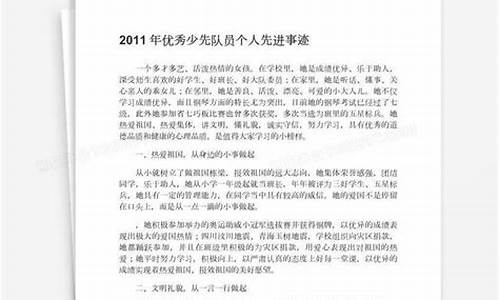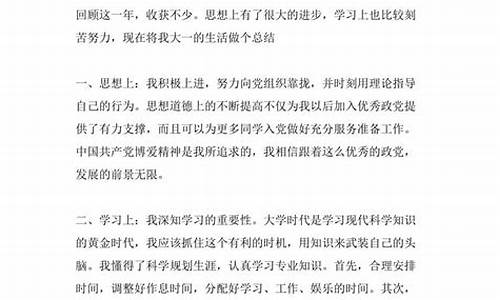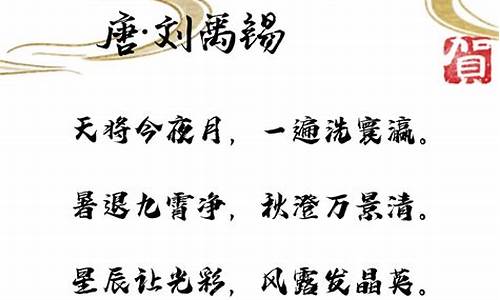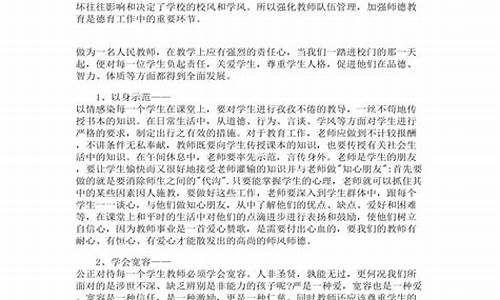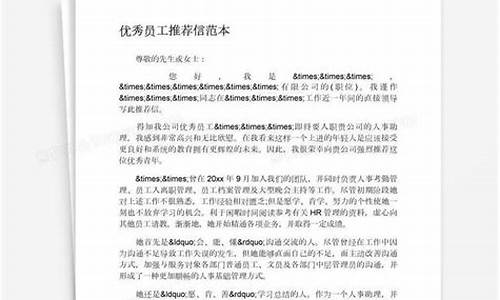您现在的位置是: 首页 > 事件作文 事件作文
八年级上册英语知识点归纳总结_八年级上册英语知识点归纳总结译林版
zmhk 2024-06-05 人已围观
简介八年级上册英语知识点归纳总结_八年级上册英语知识点归纳总结译林版 欢迎大家加入这个八年级上册英语知识点归纳总结问题集合的讨论。我将充分利用我的知识和智慧,为每个问题提供深入而细致的回答,希望这能够满足大家的好奇心并促进思
欢迎大家加入这个八年级上册英语知识点归纳总结问题集合的讨论。我将充分利用我的知识和智慧,为每个问题提供深入而细致的回答,希望这能够满足大家的好奇心并促进思考。
1.初二英语上册知识点总结归纳
2.人教版八年级上英语全部知识点、语法
3.八年级英语知识点笔记
4.八年级英语上册Unit1知识点归纳
5.八年级英语知识点梳理2021
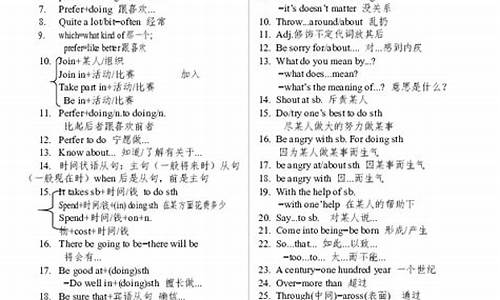
初二英语上册知识点总结归纳
有很多同学在复习八年级上册英语时,因为没有系统的总结,导致复习效率低下。下面是由我为大家整理的“八年级上册英语各单元知识点大归纳”,仅供参考,欢迎大家阅读本文。八年级上册英语各单元知识点大归纳
Unit 1 Where did you go on vacation?
[语法解析]
不定代词:不指名代替任何特定名词或形容词的代词叫做不定代词。用法注意:
1. some和any +可数名/不可数名。some多用于肯定句,any多用于否定句、疑问句和条件从句。有些间句中用some,不用any,问话者希望得到对方肯定回答。
2.由some, any, no, every构成的复合不定代词作主语时,其谓语动词用第三单
3.不定代词若有定语修饰,该定语要置于其后:如: somehing interesting
二、知识点:
1. buy sth for ab./ buy sb. sth 为某人买某物
2. taste + adj. 尝起来....
3. nothing ..but + V. (原形)除了...外什么都没有
4. seem+ (tobe) + adj 看起来
5.arrive in+大地方
arrive at+小地方到达某地
6. decide to do sth.决定做某事
7. try doing sth. 尝试做某事
try to do sth. 尽力做某事
8. enjoy doing sth.喜欢做某事
9. want to do sth.想去做某事
10. start doing sth.开始做某事=begin doing sth.
11. stop doing sth. 停止做某事
区分: stop to do sth. 停下来去做某事
dislike doing sth. 不喜欢做某事
14. so+ adj+ that +从句 如...以至....
16. tell sb. (not) to do sth.告诉某人(不要)做某事
17. keep doing sth.继续做某事
18. forget to do sth.忘记去做某事
forget doing sth忘 记做过某事
二、词语辨析:
1 take a photo/ take photos 拍照
quite a few+名词复数“许多..”
2. seeng[ 形容词看起来-.. You seem happy today.
to do sth. 似乎、好像做某事
I seem to have a cold
It seems +从句似-. It seems that no one believe you.
seem like -.好像,似乎... It seems like a good idea,
{ arive in +大地点,= gtto= reach+地点名 “到达..
arrive at +小地点
(注:若后跟地点副词here/therehome,介词需省略,如: arive here; get home)4. feel like sth/ doing sth.感觉像是...
5. wonder“想知道”,+疑问词(who, what, why)引导的从句。
because of +名/代/-ing
Because+从句,表示直接明确的原因或理由。
He can’t take a walk because of the rain.
1 don’t buy the shirt because it was too expensive.
7.enough +名词:“足够..”
形容词/副词+enough
Unit2 How often do you exercise?
[语法解析]
1.频率副词: always, usually, often, sometimes, never
频率副词在句中通常放在实义动词之前,be 动词或助动词之后。常用于一般现在时态2.“次数”的表达方法
一次once, 两次 twice,三次或三次以上用基数词+ times, three times,five times
3、howoften “多久- -次”问频率,回答常含有频率词组或短语。
常见的how疑问词:
1) How soo多久(以后)
- How soon will he be back?他多久能回来?
- He will be back in a month.他一个月后能回来。
eg.-How long did it take you to clean the house?你打扫房子用了多久?
- -It took me half an hour to clean the house.我打扫这房子用了半小时。
3) How many+名复How much+不可名“多少”问数量(how much还可问价格)二知识点: .
1. go to the movies去看**
2. look after= take care of照顾
3. surf the internet.上 网
4. healthy ifestyle健康的生活方式
5. go skate boarding去划板
6. keep healthy=stay healthy保持健康
7. eatina habits饮食习惯
8. take more exercise做更多的运动
9. thesameas与什么相同
10. be dfertfrom不同
11. oncea month一月一次
12. twice a week一周两次
13.make a dfference to对什么有影响
14. most of the students=most student
15. shop=qo shopping=do some
17. bebadfor对什么有害some shopping
购物16.begoodfor对什么有益18. come home from school放学回家
19.of course = certainly= sure当然
20. get g0 grades取得好成绩
21. keepbe in good hea
22. take a vacation去度假于成项
[词语辨析]
一、maybe/may be
1. The baby is crying,_____she is hungry.
2. The woman _____ _____a teacher.
maybe是副词,意为“大概,可能, 或许”,一般用于句首。 May be是情态动词,意为可能是.,也许是..,.大概是..
3.a few/few/a little /little
①________people can live to 100,but_________people can live to 150.
②There is____time left, I don't catch the first bus.
③Could you give me_______milk?
a few少数的,几个,
a little(点儿少量)表示肯定
few很少的, 几乎没有
little (很少的, 几乎没有)表示否定
hard / hardly
① The ground is too______ to dig .
②I can understand them.
③ hard作形容词,意为困难的,艰苦的,硬的": 作副词,意为“努力地,猛烈地"。
Hardly意为几乎不"。
4. As for homework , most students do homework every day .
as for... 意思是“至于:关于", +名词、代词或动词的-ing形式(即动名词)。
As for him, I never want to see him here.至于他,我永远不希望在这里见到。
As for the story, you'd better not believeit.关于那故事,你最好不要相信。
5.That sounds interesting.
这是"主语+系动词+表语”结构的简单句。sound (听起来),loo (看起来),smell(闻起来),taste (尝起来),feel (觉得),seem (好象),grow (变得) ,get
(变得)等词在英语中可用作系动词,后跟形容词作表语。如:
It tastes good.这味道好。
The music sounds very sweet.这音乐听起来很入耳。
The smoke grew heavier and heavier.烟雾变得越来越浓了。
2. Be about (介词)“是关..+名/代/V-ing
4.Here be is+名单:Here is a photo of my family.
“这是..”are +名复:Here are some books.
5.find(found)+that 从句:发现....
Eg:! found that most students go to school by bike.
6.percent 名词, 百分之....
百分数用基数+ perent (不用复数形式), percent 做主语时,谓语动词的数要根据其后面的名词来确定
e.g. 50% fifty percent百分之五 十
Fifly percent of the apples are bad.
50%的苹果都坏了。
Twenty percent of the meat is in the fridge.
20%的肉都在冰箱
7.not ..…at all" 一点也不”
not应放在be动词、情态动词或助动词之后。
The story isn't interesting at all.
那个故事一 点也没有趣。
8. It is+ adj. to do sth.干某事是.....
例如:It is interesting to play computer games.玩电脑很有趣。
9.the best way to do _sth. 做某事的最好方式
e.g. The best way to learmn English is through more practice
10. take, spend, pay
It takes sb.sometime to do sth.“花费某人多少时间来做某事"。
人(sb.) spend时间钱on sth.“买某物花了...钱”。
(in) doing“花 费多少时间来做某事”。
pay 的主语必须是人,而“花钱买某物”为pay .. for
11.however副词,意为“然而,可是”,表示转折关系,可放在句首、句中、句末
Unit3 I'm more outgoing than my sister.
[语法解析]形容词比较级
1.形容词的原形就是原级,
2.比较级,表示........最高级,表示最...
2.比较句型:A+be动词+形容词的比较级+than +B“A比B .... (注意: A与B必须是同级的,即必须是人与人,物与物进行对比)副词比较级常用的句型结构:
.“A+实意动词+副词比较级+ than + B”表示“A比B...
2.比较A,B两人两事物问其中哪- - 个较..时用句型;
“Who/which +谓语动词+ adj./adv.比较级,Aor B ?”
Who is thinner, Jenny or Mary?
△特殊用法
1.“比较级+and+比较级”,意为“越来越”。多音节比较级用more and more+原级
2.“the+比较级(..).. the+比较级(..)"意思是:”越..越.."The more, the better.
3.主isthe 形比+of the two+名复“ 主语是两者中..”
4.两者在某一方面相同: A+谓语动词+as+ adj/adv.原级+ as+ B.
Helen is as tall as Amy.
Peter studies as hard as Tom.
表示两者在某一方面不及另 -方时,用“not as/so+形容词或副词原级+as"
Eg. I am not as tall as my sister.
形容词,副词比较级前的修饰语。
当需要表示一方超过另 一方的程度时,可以用much, a lot, a lttle, a bit,等来修饰形容词比较级。注意:比较级不能用very, so, too, quite等修饰。
二、知识点
1.have fun=Have a good time玩得开心
have fun doing sth :做某事很开心
2. do the same things as me.
(翻译)______________________
the same ..as... 与……相同
3. A good fried is good at sports. (翻译) be good at.……擅长……… ,其后可接名词、代词或动名词。同义词组: do well in
He_______English.(他擅长英语)
I'm______basketall.(我擅长打篮球)
4. care about关心
care for关爱
take care (当/小心)
take care of (照顾)=look after
5.makes me laugh.
make sb. do sth.意为:让某人做某事
His father always makes him get up before five o' clock.(他父亲总是让他五点前起床)
让(使)某人做某事(make 后跟不带to的不定式)
make sb. +形容词:使某人保持某种状态:
e.g. My friends always make me happy
6.be like"就像.."→
I am like your sister.
Look like“外貌 上的像”→
l look like my sister.
7.That's why+句子:那就...的原因/那就是为什么...
8.It's+形+ (for sb.) to do sth. “做某事 (对某人来说)是... ”
9. make frends with sb.与某人交朋友
10. as long as只要: 既然,引导条件状语从句
11. be different from与....不同;
反: be the same as与.... 相国
12.though① adv:不过: 可是:然而(句末补充说明使语气减弱)
②conj.虽然;尽管: -although 与but不能同时用在一个句子中
eg :He said he would come, he didn't, though.他说他要来, 可是并没有来。
Though/Although he has been dead for many years, many people still remember him.尽管他已经去世很多年了,但很多人仍然记得他
13.get better grades取得更好的成绩
14.does(助动词do/did), 为了避免重复,可代替上文出现过的实意动词。
I work harder than Tom___ (is/do/does/did).
15.be good with sb.与某人相处得好
Unit4 What's the best movie theater?
[语法解析]
1)形容词最高级:用于三 者或三者以上的人或事物相比较。
2)标志词:表比较范围时用in/of
形容词最高级前须加定冠词the.副词最高级前可省略the。
表示“三者(或三者以上)中...的"的句型
1.A+ be+ the形容词最较级+表示范围(in/of 介词短语)
2.A+实意动词+ (the)副词最高级+表示范围的of/in介词短语
常用句式:
1) Who/ Which...+最高级.., B or C?
2) one of +the +形容词最高级+名词复数形式,意为“最..…之一”。
3)序数词后跟形容词最高级
二、知识点.
1、in town 在镇上
2、welcome to+地名:欢迎 来到......
3、How do you like +名/代/ving
“你认为..…怎么样?”
=What do you think of
4、Thanks for
=Thank you for +名/代V-ing:为……感谢..
5.不客气:
No problem= You' re welcome =Not at all.
6.talent n.天赋
talent show才艺表演
talented adj.有天赋的
be talented in在……方面有天赋
7. be good at擅长..(= do well in)反义短语: be poor/ weak in在... 方面弱;
be good for .....益”, 后跟人或事物,
其反义短语是be bad for.
be good to ....好(和善; 慈爱)", 相当于
be friendly to,后面通常接人
8. have ... in common有相同特征; (想法、兴趣等方面)相同
9. all kinds of各种类型的;各种各样的
different kinds of不同种类的
a kind of一种...
*kind of+ 形容词:有点儿……
kind of boring / fat /thin
10. It's up to sb. to do sth.
做某事是某人的职责
11. make up编造(故事、谎言等)
Don't make up a story.
12. take ... seriously认真对待....
Don't take it so seriously.
别把这件 事看得这么严重。
13. play a role in doing sth.
“在... 中发挥作用/扮演角色”
14. win动--won:赢得+奖 品
winner名:赢者
15. give→gave(过)
give sb. sth= give sth. tosb.给某人某物
He gave me some money.
= He gave some money to me.
16.watch sb. do sth.观看某人做了某事.
watch sb.doing sth.观看某人正在做某事
17.举例: like: 可和such as互换.
such as:常列举几个例子,不能穷尽,可和and so on(等等)连用
for example:一般只列举一个,作插入语用逗号隔开,可置于句首/向中向末;
e.g.l like fruits,apples. for example,apples, bananas and pears.
Unit 5 Do you want to watch a game show?
[语法解析]
1.询问某人对某物的观点及看法:
What do you think of ..
=How do you like...
2.描述喜好
I love/ like/ don't mind/dislike/can't stand. .
〈复习巩固一般现在时态:主语+V+其他;主语 (三单) +V(三单)+(其他)知识点〉
want+n想.....
want to do sth想 要做某事
want sb to do sth想让某人干某.....
2.mind: 介意;其后+名词/代词/V-ing
4.stand
1)“站, 站立”e.g. Stand up!起 立
2)“忍受”(多用于否定句、疑问句),后可+名/代或V-ing
5.planvt. & vi计划,打算
plan to do sth.
plan还可作名词,如: make plans制定计划
6.动词discuss (讨论) + ion→discussion
had a discussion about sth.
7. happenv.发生;出现
sth+ happens to sb."或“Sth happened +时间/地点"句式
8.情态动词: may:语气弱于can,意为“可能”
might 表推测,语气最弱,意为“可能”
may/might not表示否定推测时语气最弱,意为“可能不”
They may not be very exciting.她们可能不是那么令人兴奋
9.expect to do sth.期盼做某事
hope to do sth.希望干某事
很多动词后面都可以跟动词不定式作宾语,如:
want, like, hope, wish, learn, start, begin, prefer, try, ask
10.be famous as +职业名“作为.....而出名”,
be famous for sth.表示“以某种知识技能,作品或特征而出名”,
11.one of .….
后跟可数名词复数,表示..之一。其后的谓语动词用 单数。
e.g. One of my favorite movies is Mr. Bean.我最喜欢的**之-是憨豆先生。
12.always ready to do sh,“总是准备好做某事
13.try one's best“尽力;竭尽全力”的意思
14.show名词: “节目”:
TV shows/ talent shows
动:“展示”show sth. to sb.= show sb. sth.
15.take one's place代替;替换
16. do a good job干得好
Unit6 I'm going to study computer science.
[语法解析]
1.将来时用于表示未来将做的事,常用
"be + going to+动词原形”来表达,表示计划或根据某些现象或征兆预测不久即将发生的情。含有“打算"之意。常与tomorrow, next Sunday, next month, thed ay after tomorrow等表示将来的时间状语连用。
1).结构“ 主语+ beisam/are) going to + do sth"
2).否定式:主语+ be not+ going to do sth.
二、知识点
1. want to be/become + (职业)名词: “想要成为...
l want to be (be) a scientist when I grow up.
2.write stories写故事
tell stories讲故事
3. keep on doing sth继续做某事(表动作的反复)
keeping doing sth.保持做某事(表动作或状态的持续)
4:be sure about +名/代V-ing"肯定"
-- Are you sure about that?
make sure (a)…..确保
Make sure that both doors are closed when you go out
5. leanr sth.
We must learn English every day.
6.discuss v. 讨论;商量
名词是dscussion
discuss with sb.与某人讨论:
Discuss this question with your partner.
Let's discuss this problem.让我们讨论一 下这 个问题。
All we need now is action, not dscussion.我们现在需要的是行动, 不是讨论。
7. be able to do sth能够做某事
区分(1) can: can+动词原形,无人称和数的变化。只能用于一般现在时和一般过去时,不能用于将来时
be ableto +动原, 有人称和数的变化。 (be:isam/are) 可用于多种时态
(2) can常指客观上能够: be able to更侧重于“克服一定困难” 、“经过努力” 、“有能力”做成某事。
He will be able to(能够) speak English next year. (在此不能填can)
8. promise n. 承诺:诺言
v.许诺:承诺:答应
make a promise(to sb.)(对某人)许下诺言
keep a promise遵守诺言
break a promise违背诺言
promise sb to do sth. 许诺某人干某事
+that从句
He promised to help me.他许诺过要帮助我。
I promised that I study hard from now on.我承诺从现在起努力学习。
9.have to do with 关于;有关系
The book has to do with computers.
那本书与计算机有关。
10.take up sth. (尤指为消遣)学着做;开始做
l am going to take up coking nex year.明年我将要学煮饭。
11.Sometimes the resolutions may be too dfficult to keep.
too+形容词/副词 to+动原,表示太…...而不能...”如: .
The kid is too young to play (play) this game.这个小孩太小,不能玩这个游戏。
12. one's own+名“某人自己的东西” ,强调某物为个人所有
My own book我自己的书本
人教版八年级上英语全部知识点、语法
初二英语都有哪些知识点,下面总结了初二英语重点知识点,供大家参考。希望能够给大家的英语学习提供帮助。
一.形容词和副词比较级的用法
(1)“A+be+(倍数)+形容词比较级+than+B”表示“A比B…”或“A比B…几倍”。
(2)“A+实意动词+(倍数)+副词比较级+than+B”表示“A比B…”或“A比B…几倍”。
3. 形容词和副词最高级的用法
(1)“主语+be+the+形容词最高级(+单数名词)+in/of...”表示“……是……中最……的”。
(2)“主语+实意动词+(the)+副词最高级+in/of...”表示“……是……中最……的”。
二.简单句的五种基本句型
1.“主语 + 谓语”(即“主谓”句型)
2.“主语 + 谓语 + 宾语”(即“主谓宾”句型)
3.“主语 + 谓语 + 间接宾语 + 直接宾语”(即“主谓双宾”句型)
4.“主语 + 谓语 + 宾语 + 宾语补足语”(即“主谓宾宾补”句型)
5.“主语 + 系动词+ 表语”(即“主系表”句型)
常用的系动词有be, keep,lie, remain, stand, become, fall, get, go, grow, turn, look, feel, seem, smell, sound, taste, 等。
三.宾语从句
1.在主句中做宾语的从句叫做宾语从句。
2. 宾语从句的分类
(1)动词宾语从句:顾名思义,它是位于动词后面的宾语从句。
(2)介词宾语从句:顾名思义,它是位于介词后面的宾语从句。
(3)形容词宾语从句:顾名思义,它是位于形容词后面的宾语从句。
3. 引导名词性从句的连接词
(1)that:没有含义,在宾语从句中不做成分
(2)whether/if:表示是否,在宾语从句中不做成分。
(3)连接代词:what, which, who, whom, whose(在宾语从句中做主、宾、表和定语)
连接副词:where, when, how, why(在宾语从句中做状语)
八年级英语知识点笔记
1.形容词和副词的比较级
(1) 一般在形容词或副词后+er
older taller longer stronger, etc
(2) 多音节词前+more
more interesting, etc.
(3) 双写最后一个字母,再+er
bigger fatter, etc.
(4) 把y变i,再+er
heavier, earlier
(5) 不规则变化:
well-better, much/many-more, etc.
2.祈使句:
Sit down please
Don’t sit down, please.
3. there be 结构
肯定句: There is a …
There are …
一般疑问句:Is there …? Yes, there is./ No, there isn’t.
Are there…? Yes, there are. /No, there aren’t.
否定句: There isn’t …. There aren’t….
4.一般现在时:通常用 “usually, often, every day, sometimes”.
形式:
肯定句:
I go to school on foot every day.
She goes to school on foot every day.
5.现在进行时:形式: be + verb +ing
eg: I am(not) doing my homework.
You/We/They are(not) reading.
He/She/It is(not) eating.
动词 —ing 的形式
Most verbs +ing walk—walking
Verbs ending in e -e + ing come—coming
Short verbs ending in a vowel + a consonant run –running swim—swimming
6.
重点的句型:
1.How many + 复数名词 + are there ...?
此句型是一个特殊疑问句,意思是\"在.有多少.?\"多用来对可数名词的数量提问.How many 后面要接可数名词的复数形式.如:
How many apples are there on the table? 桌子上有多少个苹果?
2.. What about ...?
此句型意思是\".怎么样?\"、\".呢?\",通常用来询问情况或征求意见、看法等.其中的about是介词,后面可接名词、代词或动词等.如:
What about that computer? 那台电脑怎么样?
My gloves are red. What about theirs? 我的手套是红色的,他们的呢?
What about playing games after school? 放学后做游戏怎么样?
3. What time is it?/What\'s the time?
英语中,常用这两个句型来询问现在的时间,意思是\"什么时间了?\"或\"几点了?\"其答语一般用\"It\'s + 时间.\"其中的it指代时间,翻译时可不译,常在句尾加上please,以表示委婉的语气.如:
What time is it, please? 请问现在几点了?
-It's about a quarter past ten. 大约十点十五分.
4. What colour + be + 主语?
询问某物的颜色,一般用以What colour 开头的特殊疑问句,其答语通常用\"It\'s/They\'re + 表示颜色的形容词\".如:
-What colour is her blouse? 她的衬衫是什么颜色的?
-It's light blue. 是浅蓝色的.
5.Whose + 名词 + be + 其它?/Whose + be + 名词?
英语中常用这两个句型来询问某事物属谁所有.如:
Whose cup is that? 那是谁的杯子?
Whose are these photos? 这些照片是谁的?
6. It's time for + sth. /It's time to do sth. / It's time for sb. to do sth.
这个结构意思都是\"该做某事了\",\"到做某事的时候了\".如:
It's time for school. 到上学的时候了.
It\'s time to have supper. 该吃晚饭了.
7. 选择疑问句:选择疑问句是用or连接询问的两部分,以供选择,答案必须是完整的句子或其省略形式,不能用Yes或No回答
一般提出两种或两种以上的可能,问对方选择哪一种.其结构可用一般疑问句,也可用特殊疑问句.供选择的两部分用or连接,前者读升调,后者读降调.
e.g. Will you go there by bus or by train?
What would you like, coffee or tea?
How many pens do you have, one or two?
选择疑问句的答语必须是完整的句子或其省略式,不能答yes或no.
e.g. Do you go to school by bus or by bike?
By bus.
Which would you like, tea or coffee? Coffee.
一般疑问句演化来的选择疑问句
e.g. Is it right or wrong?
Were you or he there?
Are they reading, chatting or watching TV?
特殊疑问句演化来的选择疑问句
e.g. Which do you like better, coffee or milk?
What color is it, red, blue or yellow?
Where are you going, to the classroom or to the library?
or not构成的选择疑问句
e.g. Do you want to buy it or not?
Are you ready or not
8.另外,“to be + going + 动词不定式”这个特殊的结构可表示在未来即将要进行的动作.
例:He is going to tell me tomorrow - 他将在明天告诉我.
练习题:
There are ____ water in the bottle.(B)瓶子里有一点水
There are ____ water in the bottle.(A)瓶子里没水了
There are ____ students in the classroom.(D)教室里有几个学生
There are ____ students in the classroom(C)教室里没有学生
There are ____ apples on the trees.(D)有几个苹果长在树上
选项统一为
A、little B、a little C、few D、a few
3. Of course,every one of us_1__to make friends like food---they are useful to us,and they can help us when we are _2__need._3__you can make as many friends of this kind as possible.
(1) A.want B.will want C.wants
(2) A.in B.on C.for D.of
(3) A.And B.But C.So D.Because
答案:CAC
4.Twenty minutes later,John_1__a tree.His leg was broken,and it hurt _2__.
Mr smith _3__to mend the chair.then he_4__himself with a hammer.
(1) A.fell over B.fell from C.fell down D.fell on
(2) A.all the day B.all day C.whole day D.all days
(3) A.starts B.started C.was starting
(4) A.damaged B.knocked C.hit D.cut
答案:BABC
八年级英语上册Unit1知识点归纳
黑发不知勤学早,白首方悔读书迟。对于英语,我们需要把陌生的单词片语和句型语法不断的熟悉和熟练。因此,重复重复再重复,熟练熟练再熟练,是学会英语的不二法门。下面是我给大家整理的一些 八年级 英语的知识点,希望对大家有所帮助。八年级上册英语知识点归纳
重点 短语
1. have a soccer game 进行一场 足球 赛
2. fall ill 病倒了
3. be a little far from… 离……有点远
4. right away = at once 立刻;马上
5. miss a good chance 错过一个好机会
6. get/miss a goal 得到/失去一分
7. shame on sb. 为某人感到羞耻
8. do one’s best 尽某人的力
9. say sorry to sb. 对某人说抱歉
10. be sure to do sth. 确定做某事
11. be angry with… 生某人的气
12. with one’s help= with the help of sb. 在某人的帮助下
13. serve food 上菜
14. turn up/down… 调高/低(音量)
15. keep sb. doing sth. 让某人一直做某事
16. in a minute 一分钟后;马上
17. on the phone 在电话中
18. take a seat 就坐
19. never mind 不要紧
20. a lot of traveling 一系列旅行
八年级下册英语五单元知识点归纳
一.重点句型。
1. I get so nervous when I give a speech. 只要发表演讲,我就紧张。
give (sb.) a speech 做 报告 ,做演讲;
e.g. Our school will invite a scientist to give us a speech about feelings next week.下周,我们学校将邀请一位科学家给我们做一个关于情感的报告。
2. I have a CD about giving speeches. 我有一张有关发表演讲的CD。
3. I feel more relaxed now because of your help. 有了你的帮助,我现在感觉轻松多了。
A. because of+代词/介词短语,“因为(某人/某事物);由于”,在句中作状语。
e.g. He walked slowly because of his bad leg. 他走得慢是因为腿有毛病。
B. because 连词, “因为”,用来连接原因状语从句。
e.g. I did it because he told me to. 我做这事是因为他叫我做的。
4. What is Kangkang’s suggestion for helping Michael?
suggestion 意为:“建议,提议”,为可数名词。 其的动词:suggest。 同义词 : advice, 为不可数名词。
e.g. I’d like to hear your suggestions for ways of raising money.
= I’d like to hear your advice for ways of raising money.
关于筹集资金的办法,我想听听你的意见。
make a suggestion 意为:“提建议”。
e.g. Can I make a suggestion? 我提个建议好吗?
5. Relax and just follow the dentist’s advice. 放轻松,只要听医生的建议。
A. advice 意为:“建议”, 不可数名词。
advice 可被 some, any, no 等词修饰,不可被an或其他数词直接修饰。
英语学习 方法 技巧
语言学习者要记忆大量的词汇,背诵 英语单词 、短语是每一个英语学习者面临的艰巨任务,也是令每一个英语学习者感到棘手的问题。成人如此,小学生也不例外。因此,在英语学习的启蒙阶段,让小学生了解单词记忆的一些策略是十分必要的。
(1)读音记忆法:根据单词的读音记忆单词。它是记忆策略的首选,也是学好英语的重要途径。在教学中,我们经常会发现一些学生能够阅读,也会用 英语写作 ,却不会用英语与人交流,甚至在课堂上不敢张开嘴巴说,即出现所谓的“哑巴英语”现象。根据读音记忆单词,既可以避免“哑巴英语”现象,又能培养学生良好的英语学习习惯,提高学习效率。
(2)联想记忆法:设法把单词的音或形或义联系起来。人的记忆能力,主要来自联想。 记忆力 强的人,都具有较强的联想能力。记忆以联想为基础,联想的建立为记忆提供更多的线索,线索越多,记住一个单词就越容易,提取这个单词也就越顺利。我们可以 总结 出以下几种联想法:
拼写联想,将拼写类似的单词集中在一起记忆,如:book,cook,look;bar,car,far,farm;boy,toy;bee,see,tree等。
意义联想,从词义方面联想与其有相近或相反关系的单词。如:同义词good——nice; 反义词 good——bad;old——young;tall——short。
归类联想,即将同类单词集中在一起记忆。如由red联想到各种颜色:green,yellow,brown,white,purple,blue,orange,black,pink;由eye联想到身体各部分:head,face,ear,nose,arm,heel,elbow,hand,finger,leg,foot,toe等。
形义联想,就是对单词的结构赋予一定的形象。如:eye可以认为单词中的两个e就是两只眼睛,y是一个鼻子。
视觉图像联想法,即在语言学习中,可以给加上标签,或者看到词与词组时产生视觉想象。研究表明:大部分同学有采取视觉图像学习的倾向性,因此在小学课本中会有大量的插图,利用学习的效果显著。
感觉或动作联想法,即学到某一个单词时,会产生相应的感觉或做出相应的动作。例如:当我们学到“cold,hot...”等词时,会产生“冷、热…”的感觉;学到“playfootball”时,应想到或做出“踢足球”的动作,这是一个事半功倍的办法。我在学习“drop”一词时,让同学们把手中的东西,如铅笔、尺子、书等掉下来,后来单词测验时,几乎没有同学不知道drop的中文意思是“掉下”。
八年级英语知识点笔记相关 文章 :
★ 八年级上册知识点英语笔记
★ 八年级英语上册知识点归纳
★ 八年级英语下册知识点笔记
★ 八年级英语语法知识点归纳总结
★ 初二英语知识点总结
★ 人教版八年级英语知识点总结
★ 八年级英语知识点部编版
★ 初二英语知识点归纳
★ 八年级英语知识点归纳总结最新
★ 八年级英语上册知识点归纳小总结
八年级英语知识点梳理2021
在我们平凡无奇的学生时代,大家都背过各种知识点吧?知识点是指某个模块知识的重点、核心内容、关键部分。那么,都有哪些知识点呢?以下是我精心整理的八年级英语上册Unit1知识点归纳,仅供参考,大家一起来看看吧。八年级英语上册Unit1知识点
第一单元主要点:
①复习一般过去时
②复合不定代词的用法
③反身代词的用法
④系动词的用法
⑤动词后的t d和ding 的区别
⑥ed形容词和ing形容词的区别
⑦“近义词”的区别
⑧本单元中的主谓一致现象
⑨动词过去式的构成及不规则动词表
⑩用同义短语转换同义句时谓语动词形式一致性的培养。
⑾感叹句的结构和连词的`选择。
一、词组、短语:
1、g n vacatin去度假 ,
2、 sta at he 呆在家,
3、g t the untains 上山/进山 ,
4、 g t the beach到海边去,
5、visit useus 参观博物馆,
6、g t suer cap 去夏令营,
7、 quite a fe而且因为坏天气,我们也没能看到下面的
任何景色(P5)
辨析:because f与because
a. because f意为“因为,由于”,后可接名词、代词或动名词,不能接句子。
He lst his b because f his age.
b. because意为“因为”,引导状语从句,即接句子。
I didn’t bu the shirt because it
frget ding sth. 意为“忘记做过某事(事情已经做过了)” eg: I frget clsing the
15. Abut ne hur later, 老师刚才告诉我们擦窗户。
2)eep ding sth. 意为“继续做某事,一直做某事”。
She TV fr tw hurs last night. 昨晚她持续看了两个小时的电视。
23. Everne uped up and dwn in exciteent. 大家都兴奋地跳起来。(P8)
up and dwn 意为“上上下下;来来回回”,在句中作状语。
22. 反身代词:self , urselves, urself , urselves, hiself, herself, itself, theselves.
作动词或介词的宾语:经常在en, teach, hurt, bu, intrduce, dress, ill等动词和b, fr, t, f等介词后作宾语。一年主考宾语回自身
He is teaching hiself English.她在自学英语。
She was taling t herself.她自言自语。
He lives b hiself in the cuntr.他独自住在乡下。
1) Help urself! 请随便吃吧!/请自己去取吧!
2) Mae urself at he! 别客气!
3) ae urself heard /understd. 使你的话被人听得见/理解
4) teach neself 自学=learn b neself
5) b neself 独自
6) fr neself 为自己;替自己
7) en neself 玩的愉快
8) dress neself 给自己穿衣
23.few, little, a few, a little :的用法few, a few修饰可数名词,little, a little修饰不可数名词。few, little具有否定意义,表示“几乎没有”,a few, a little具有肯定意义,表示“一些”。
He has little ne, but few students want t lend ne t hi.他几乎没有钱,但是几乎没有学生想借钱给他。
There is a little il and a few apples left in the fridge.冰箱里还有一些牛奶和一些苹果。
拓展: 八年级上册英语知识点:Unit2
短语归纳
SectionA
1.howoften多久一次
2.readEnglishbooks看英语书
3.ofcourse当然
4.onweekends在周末
5.gotothemovies去看**
6.hardlyever几乎不;不曾
7.everyday每天
onceaday每天一次
8.twiceaweek每周两次
threetimesamonth每月三次
9.usetheInternet上网
10.havedanceandpianolessons上舞蹈和钢琴课
11.playtennis打网球
12.helpwithhousework帮忙做家务
13.atleast至少,不少于
SectionB
1.junkfood垃圾食品
2.drinkmilk喝牛奶
3.threeorfourtimesaweek一周三到四次
4.eatfruit吃水果
5.wantsb.todosth.想要某人做某事
重点句子
1.howoftendoyouexercise?
你多久锻炼一次
2.—Whatdoyouusuallydoonweekends?
—周末你通常干什么?
—Iusuallyplaysoccer.
—我通常踢足球。
3.Shesaysit’sgoodformyhealth.
她说这对我的健康有好处。
4.Howmanyhoursdoyousleepeverynight?
你每天晚上睡多少个小时?
天才就是勤奋曾经有人这样说过。如果这话不完全正确,那至少在很大程度上是正确的。学习,就算是天才,也是需要不断练习与记忆的。下面是我给大家整理的一些 八年级 英语的知识点,希望对大家有所帮助。英语八年级上册知识点 总结
一、 v+ do
1. Let sb do sth 让某人做某事
Let sb not do sth 让某人不做某事
2.why not do sth = why don’t you do sth 做什么怎么样 为什么不做?
Why not put on a raincoat, its raining outside. 外面在下雨,为什么不穿个雨衣呢?
3. Make sb do sth 使某人做某事
I will do my best to make my dream come true. 我会尽我所能去使我的梦想实现。
Make sb + adj 使某人………..
The story makes us happy。
二、v+ doing
1. practice doing sth 练习做某事 our English teacher told us to practice speaking English
every day。英语老师叫我们每天练习说英语。
2. finish doing sth 完成做某事 my mum asks me to finishing cleaning up my room before
she come from work。 妈妈要求我在她下班回来之前打扫干净我的房间。
3. Enjoy doing sth 享受做某事
The boys are enjoying playing basketball 孩子们正在操场上享受打 篮球 。
4. stand doing sth 忍受做某事她不能忍受欺骗他人
5. mind doing sth 介意做某事? 你介意开门吗?
6. keep doing sth. 继续做某事
She will keep fighting in this new semester. 在新学期,她将继续努力奋斗
八年级上册英语期中知识点总结
一、重点 短语 :
1.on weekends
2.on weekdays
3.as for
4.my eating habits
5.have a healthy lifestyle
6.the same as
7.the result of
8.junk food
9.get good grades
10.see a dentist
11.have a healthy habit
12.be stressed out
13.a balanced diet
14.for example
15.at the moment
16.be sorry to do sth
17.go bike riding
18.take walks=go for walk
19.take a vacation
20.plan to do sth
21.western country
22.take sth with sb
23.depend on
24.host family
25.hardly ever
26.ask sb about sth
27.get back to school
28.a balance of
29.kind of
初二期末英语语法知识点总结归纳
1.主语:
表示 句子 所说的是“什么人”或“什么事儿”,一般由名词,代词或相当于名词的词或者短语充当
例如:Gina is from Australia.
She often goes to the movies.
This kind of juice tastes good!
2.谓语:
主语发出的动作。一般是有动作意义的动词。谓语和主语在人称和数两个方面必须保持一致。
例如: We are both quiet.
He has a smart phone.
You should study harder.
Her parents are teachers.
3. 宾语:
分为动词宾语和介词宾语,属于动作的承受者。
例如:He's playing soccer.
Good food and exercise help me to study harder.
4. 系动词:
表示状态或状态变化的动词,没有实际的动作意义。如 be, 感官系动词(look, sound, smell, taste 和 feel)、保持类系动词(keep, stay 和 remain)、状态变化类系动词(become、get、turn 和 go)等。
This picture looks so beautiful.
Keep working, you will see the post office on your right.
八年级英语知识点梳理总结相关 文章 :
★ 八年级英语知识点归纳总结最新
★ 人教版八年级英语知识点总结
★ 八年级英语语法知识点归纳总结
★ 人教版八年级下册英语知识点总结
★ 八年级英语上册知识点归纳小总结
★ 人教版八年级英语知识点总结
★ 八年级英语上册知识点归纳小结
★ 初二英语知识点总结
★ 八年级上册英语知识点归纳
★ 八年级上册英语重点总结
好了,今天关于八年级上册英语知识点归纳总结就到这里了。希望大家对八年级上册英语知识点归纳总结有更深入的了解,同时也希望这个话题八年级上册英语知识点归纳总结的解答可以帮助到大家。

